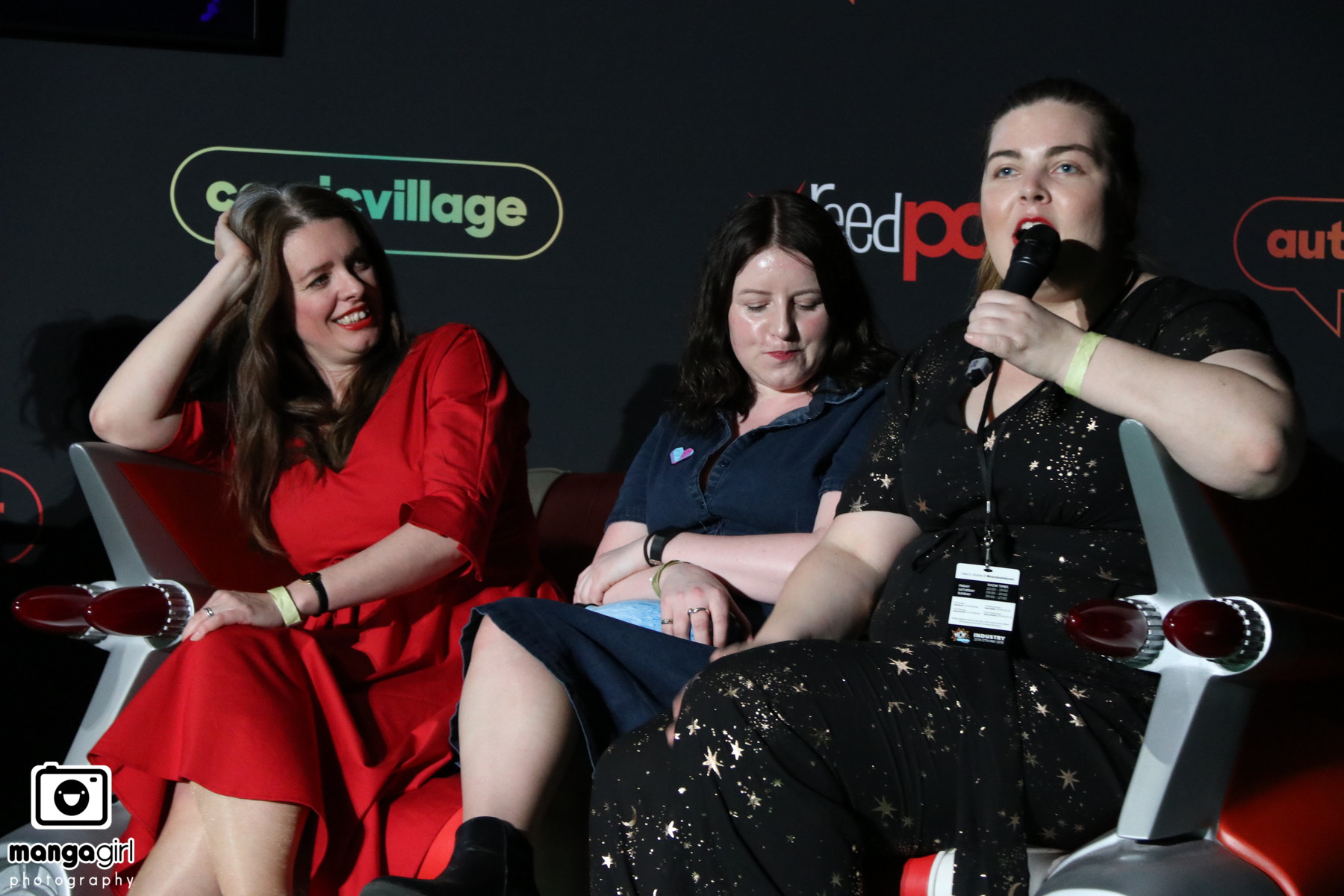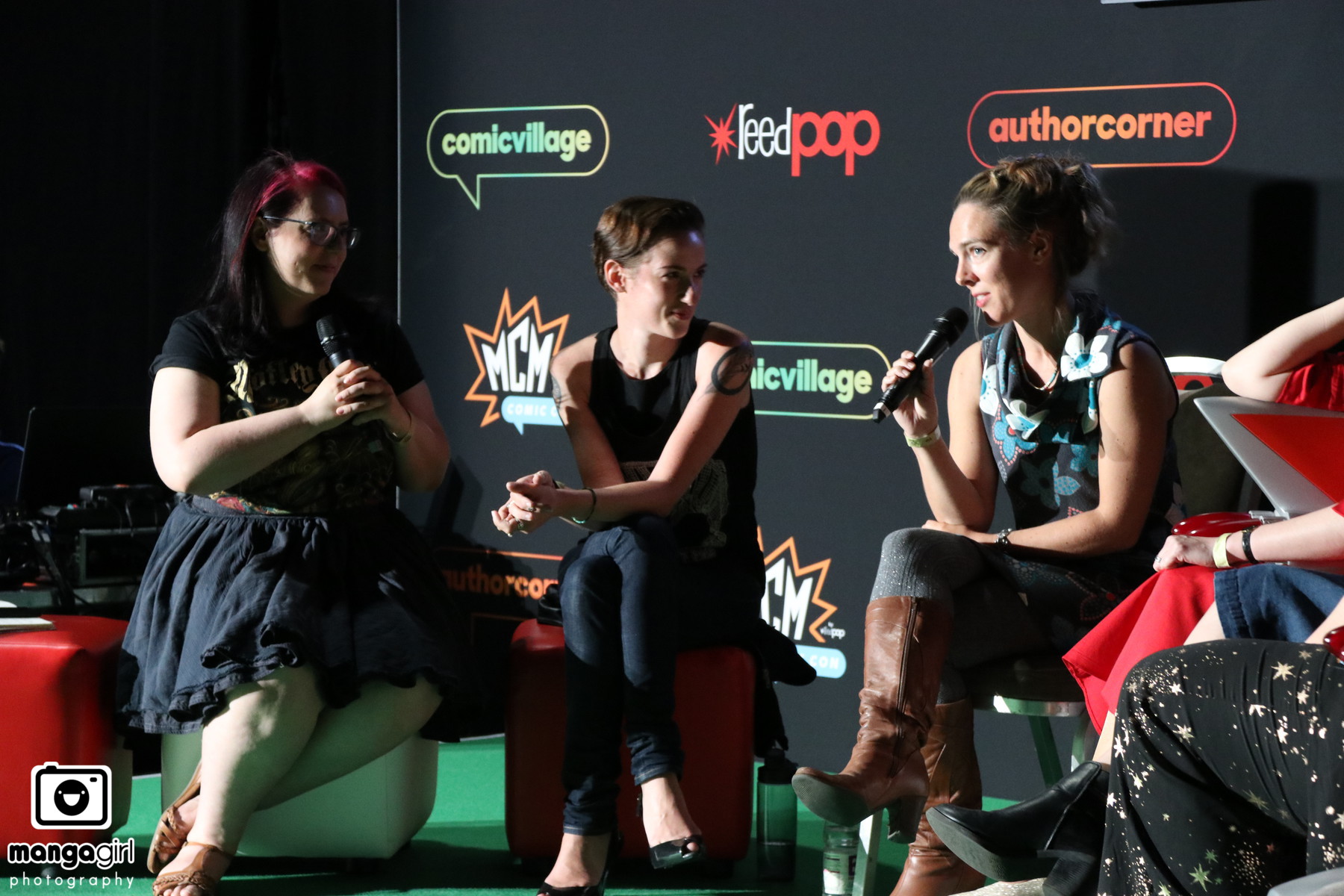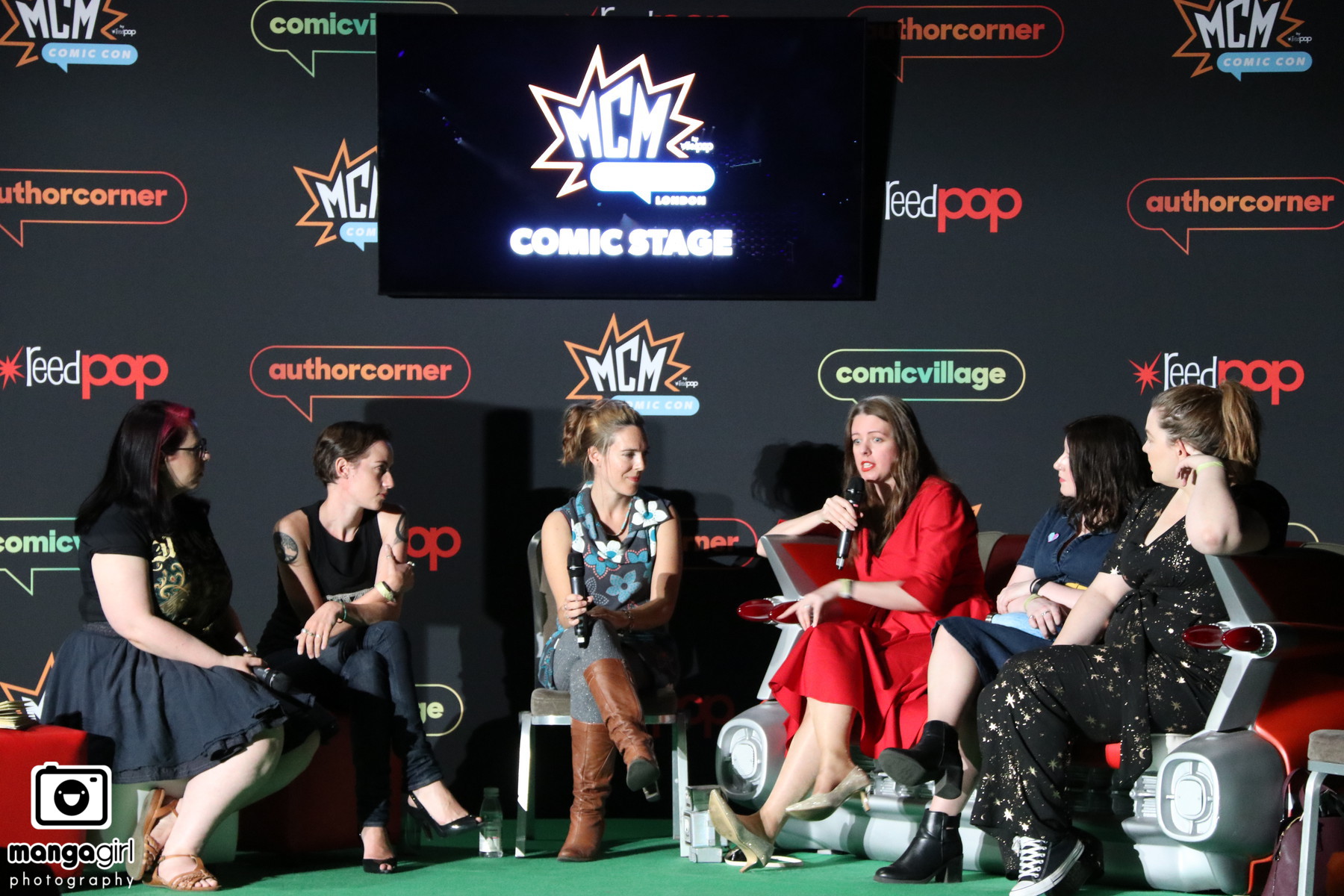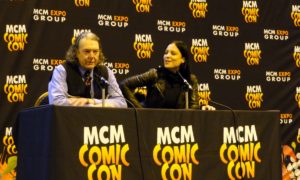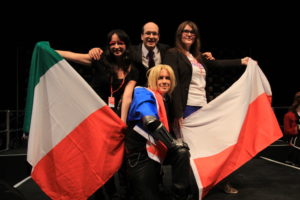The Sunday of MCM London Comic Con saw the Comic Village stage host a Wonder Women of Pop Culture panel. Moderated by Leila of the Post-Apocalyptic Book Club & Dark Societies, the panel included Laure Eve, author of The Graces; Heather Child, author of Everything About You; Emma Newman, author of the Split Worlds series; Melinda Salisbury, author of State of Sorrow, and Alwyn Hamilton, author of the Rebel of the Sands trilogy. The discussion covered their journeys as writers within their respective field and female representation in books and TV.
As the panel went underway, they were asked what a good character needs to have, be it as a consumer or when writing their own novels.
“They need to have their own agenda to be a character that I actually want to follow,” said Alwyn.
Laure agreed and said that she liked complicated characters and unlikeable ladies. “The only real necessary trait that you have to have for an unlikeable character is for them to be relatable,” said Laure. “So you have to understand why they are how they are. Then they can be as unlikeable as you like.”
Heather cited having a very funny female character and that it doesn’t happen enough. “People find it quite easy to make male characters funny,” said Heather. “If you can make your female character funny, then you’ve really nailed a nice, well-rounded, female character.”
Emma agreed with Alwyn on agenda and also mentioned having more characters “with realistic, vulnerable portrayals of mental illness, that are nuanced.” She added, “There are so many people in my life, and hello, I’m one of them, who have mental illnesses, who are there every day, turning up and fighting, and that’s what I want to see more of from characters in fiction.”
“I just need people to not be cardboard cutouts, not be trope characters,” said Melinda, who felt that we rarely see whole, well-rounded female characters. She exemplified this, saying, “I want to see cis female characters dealing with cis female stuff. I want to see women on periods, women getting home after a hard day of kicking ass and taking their bras off. I also want to see transgender characters dealing with the kickback from what their body is making them do versus what their mind is telling them.”
Alwyn then highlighted the parody trailer for Michelle Wolf’s Featuring A Strong Female Lead: The Movie, from her show, The Break with Michelle Wolf. “I think that’s what we don’t want to see in female characters, like, ‘Look, it’s a female character that is just exactly like a man, except that she is a woman.”
 |
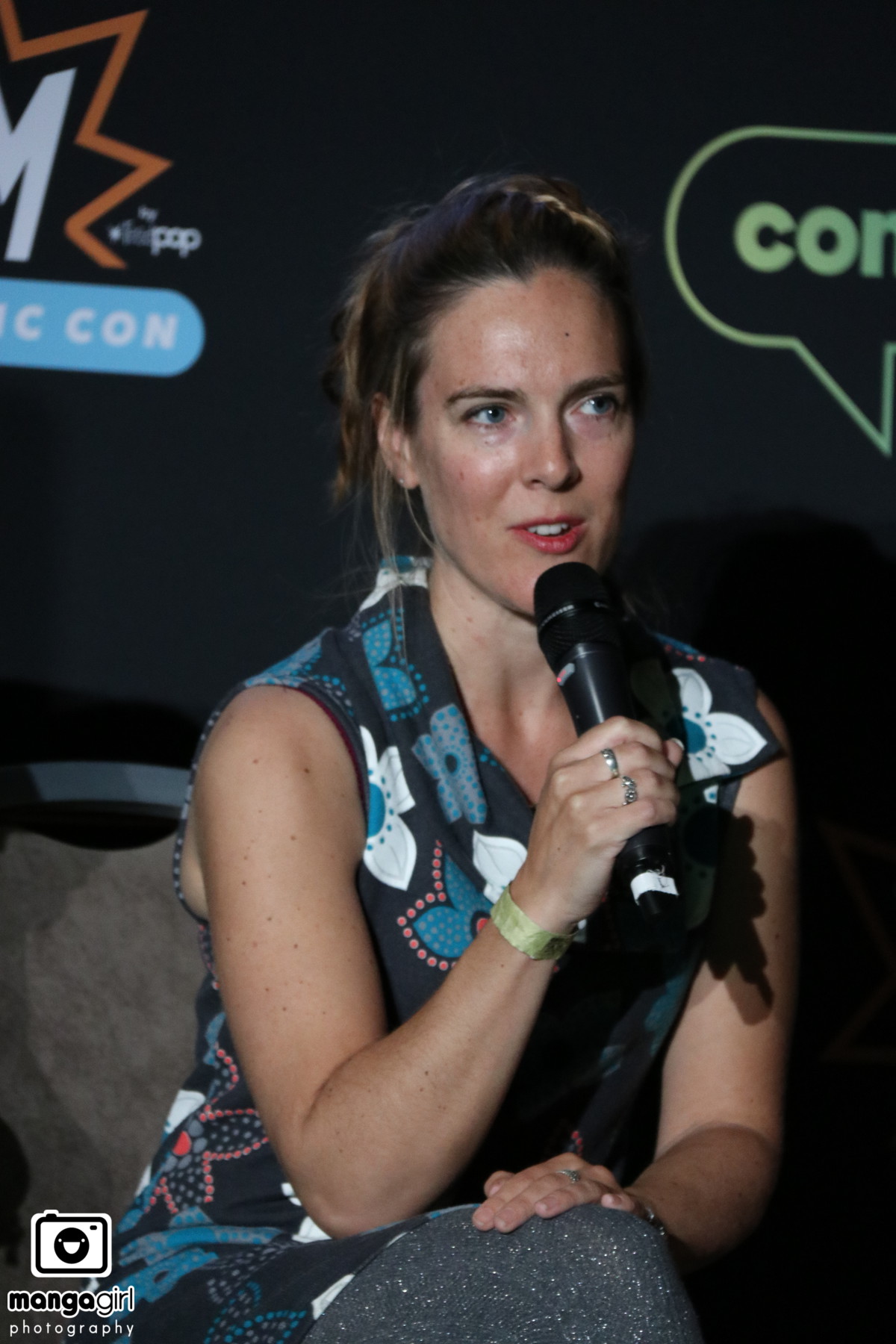 |
The panel was then asked which female characters tropes they would like to lock away in Room 101.
“Clumsiness as a character flaw,” said Melinda “It’s not a flaw. It’s just a thing that happens sometimes because spatial awareness is difficult and hips are a thing.” Also, “Taking off your glasses and instantly becoming the most beautiful woman the world has ever seen.”
“Beautiful girls who don’t know that they’re beautiful,” said Laure.
“I was about to say that,” responded Alwyn.
“Beautiful girls know they’re beautiful,” added Laure.
Alwyn then referred to Vulture’s feature on How 50 Famous Female Characters Were Described in Their Screenplays, calling many of the descriptions tedious.
Laure illustrated her point, saying, “You know that the female character is that way because you need her to be naïve enough so that the hot guy, who’s going to come along and give her her identity, can do so.”
Emma highlighted female characters who are only there to assist the progress of male characters, saying, “They only exist with reference to the male character. They are only the wife or the daughter that needs to be rescued.”
Heather agreed with Emma, saying, “Like every Adam Sandler film, ever.”
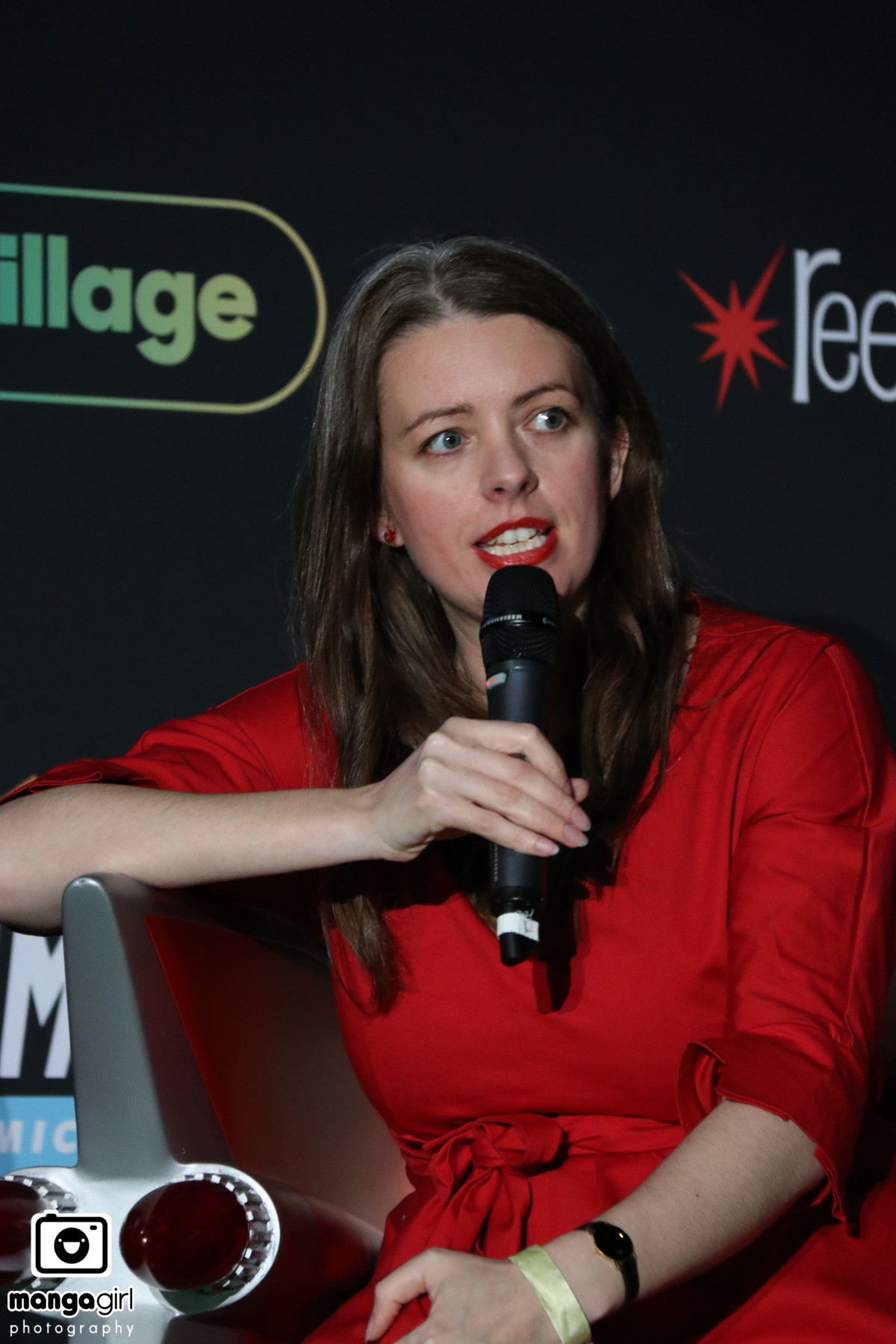 |
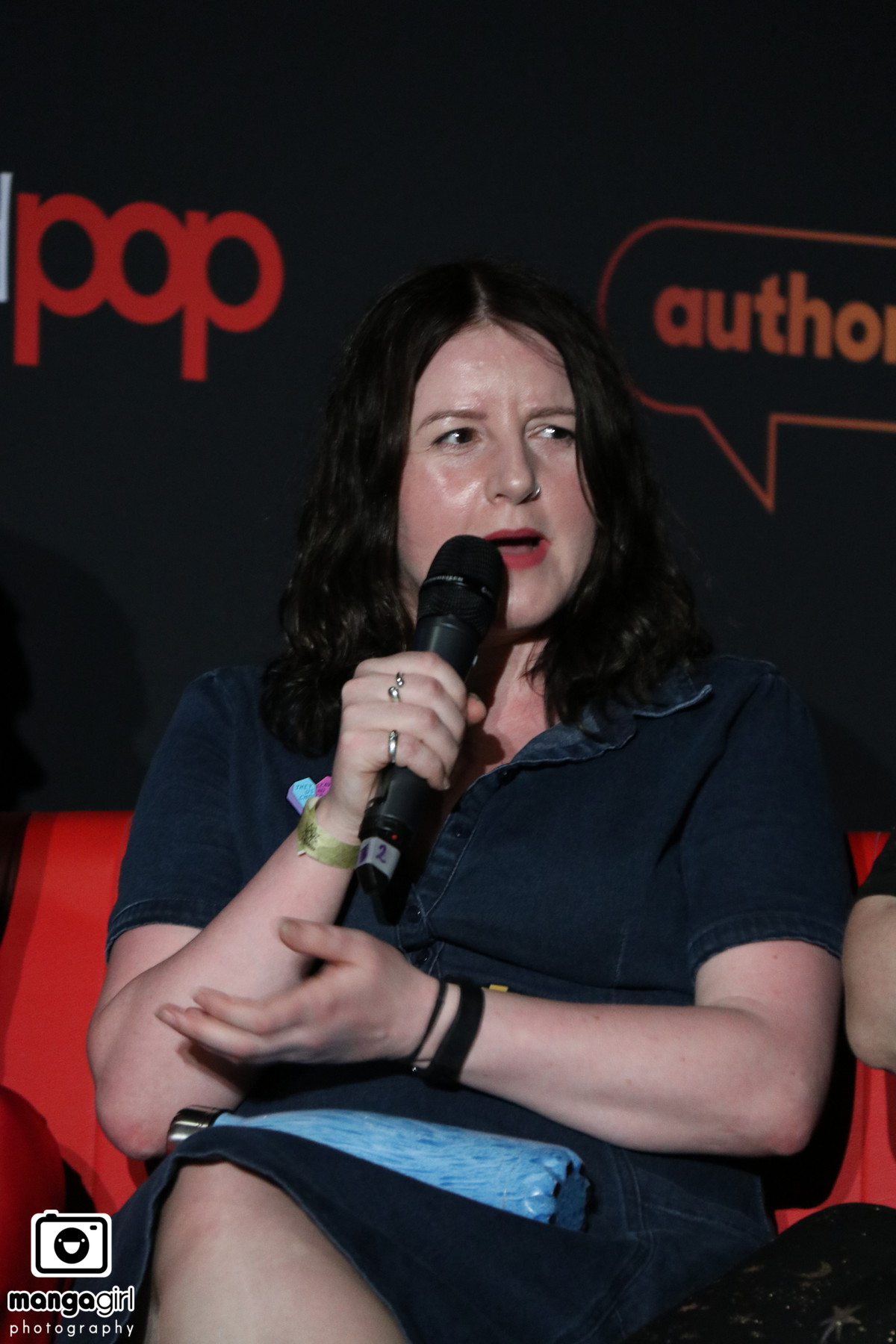 |
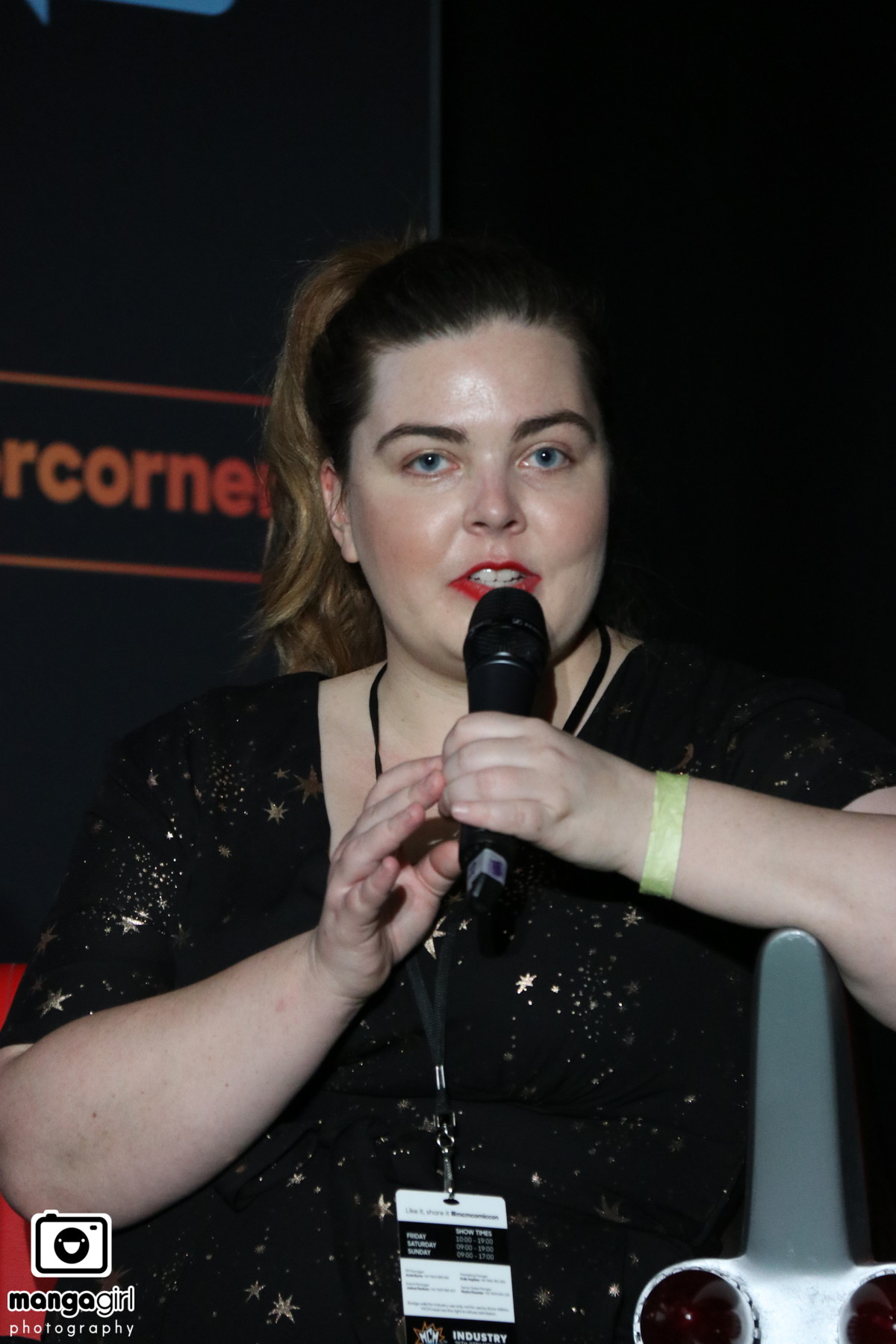
The panel was then asked if there were any authors or TV shows that were doing it right.
The shows they mentioned included Jane the Virgin, The Good Place, The Marvelous Mrs Maisel, Miss Fisher’s Murder Mysterious (“Not just getting the women characters right, but having a woman in her forties being glamorous as fuck,” said Emma), and Brooklyn Nine-Nine.
Alwyn talked about wanting to see more than one female character. “I like seeing when there’s multiple female characters because you then get a spectrum of what you can relate to.” Using the characters Rosa Diaz, Amy Santiago and Gina Linetti from Brooklyn Nine-Nine as an example, she added, “One is emotionally closed off and kick-ass, one is a really nerdy, really into the details and OCD rule-follower, and then one is like a borderline-psychopath but kicks ass in her own way. They’re all different types of women. It’s nice to not just have one awesome woman.”
The authors were then asked if they faced any challenges or pushbacks when it came to writing their own female characters.
Emma mentioned drawing on her own experience when it came to writing the female protagonist for Before Mars, one who suffers from post-natal depression. “Because I drew a lot on my own experience of it, it was really awful,” said Emma, who revealed that she was miserable throughout, felt at the time that it was the worst thing she had ever written and that no one would want to read it. “Writing the book, it felt like I had to fight myself, in a way that I didn’t have to fight myself with all of the other things I’ve written.” Her husband pointed out that she was drawing on a dark stage of her life she was still dealing with. Only when it came to promoting and talking about Before Mars did she realise that he was right.
“The only kickback I’ve ever had is from adult readers who don’t like when my teenage characters behave like teenagers,” said Melinda. “They’re like, ‘Oh, I would never have done this.’ Well, it’s not your biography, so that’s fine. And, you’re significantly older than the character you’re judging. She doesn’t quite have your level of expertise and insight into a situation.”
As questions turned to attendees, the panel was asked for any advice they would offer to young aspiring authors. Alwyn advised to not put so much pressure on yourself, saying, “Be patient, take the time you need to write until you have something you’re really happy with and really excited.”
Melinda recommended that you finish what you start rather than jumping straight into new ideas. She also advised being nosey and stalking people. “I get so many great ideas from low-key breaking into places I shouldn’t be in and from listening to conversations I shouldn’t be listening to.” Alwyn shook her head upon hearing this as Melinda made it clear that she did not condone crime. However, she did say that “if you happen to be walking past an abandoned building, a bit of fence falls down, then you drop your phone inside the fence and have to go in and get it, then you get lost, that’s not your fault.”
“Ignore all writing advice, even from authors,” said Emma. “There are endless amounts of conflicting advice. What I found was very important for myself was to experiment. I’m quite an analytical and scientific person so I would say, ‘Okay, for the next three weeks I’m going to have a go at writing a thousand words a day. I’m going to have a go at NaNoWriMo. I’m going to do all of these things. Take the pressure off yourself and say you are doing an experiment and gathering data, because everyone has their own best way of working and it’s up to you to find it yourself.”
“Try to have an objective, if you can, that is not to get published,” said Heather. She also recommended listening to Neil Gaiman’s Inspirational Commencement Speech at the University of the Arts. “It’s all about the individual artist and how you get to what you want to achieve.”
“Every single writer and artist of any calibre has started by copying stuff that they loved,” said Laure, who revealed that she did just that when she was a teenager, by writing The X-Files fan fiction. “It doesn’t matter that you’re literally taking someone else’s stuff and copying it, because what it teaches you is why you love that and how to take what you love about it and create it in your own world.”
Another question from an attendee had the authors being asked if they could give one phrase of inspiration, what would it be.
Alwyn said, “Don’t be afraid to do something just because you think it will take too long. That time will pass anyway, whether you do the thing or not.”
Melinda followed up with, “Don’t be mean to anyone on the way up that you’re going to meet again on the way down.”
Emma said, “Perfectionism is the fear’s favourite coat. It’s hiding.”
Heather said, “Imagination is a muscle, so make sure you work it.”
Laure quoted Stephen Hawking and said, “Remember, look up at the stars and not down at your feet. Be curious.”
A question from the audience asked the panel if they talked about ideas they were unsure about with others, or just kept it to themselves.
“I have very strong feelings about this,” said Emma. “When I have an idea, I don’t tell anybody. It’s a seed that I plant and it’s a very fragile sapling. It needs to be protected from the cold winds of people who do not understand that shit.” She also added that talking about your idea a lot results in you not writing that idea, but if you are going to talk about it to someone then “you have to pick who you have those conversations with extremely carefully.”
“Until I finish the first draft, I’m really secretive,” said Melinda, adding that she is very precious about her ideas. “I don’t even tell my agent what I’m really doing.”
Before coming to a close, the authors were asked which books they would recommend the audience to read.
“I just finished Circe by Madeline Miller,” said Melinda. “It’s probably the best book I’ve ever read in the world and I really don’t want to write anything else, because I don’t see the point anymore.”
Laure revealed that she is reading a lot of non-fiction and recommended Seven Brief Lessons on Physics by Carlo Rovelli. “It will tell you literally everything about all of those weird theoretical physics things that you never thought you could understand.”
Emma listed The Sparrow by Mary Doria Russell, Guns of the Dawn by Adrian Tchaikovsky and The High Ground by Melinda Snodgrass. She also quickly added The Artist’s Way by Julia Cameron, a book to help unleash your creative self. “I didn’t write for ten years and then I worked through half of the book and I wrote my first novel in 26 days,” said Emma. “It works. Go find it.”
“I’m going to throw in a writing book for any aspiring authors,” said Heather, “The best one that I read is Story Genius by Lisa Cron.”
Alwyn recommended The Strange and Beautiful Sorrows of Ava Lavender by Leslye Walton. “It’s a wonderful and underrated book about multiple generations of women.”
Photos by Harriett Greene (Manga Girl Photography)
Originally published on MyM Buzz on 29 May 2018.

